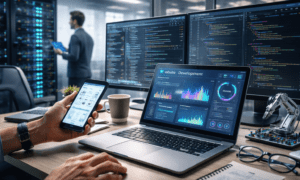SXSW Sydney is where technology, creativity, and big ideas blend into a vibrant experience for those who like to ask big questions, discuss world-changing developments, inspire, and be inspired. AI takes center stage this year with experts from diverse fields examining its formative effect on our present and future. The Tech & Innovation tracks, especially, invite you to examine AI from various perspectives, ranging from technical to ethical and beyond, providing a comprehensive look at where the field is truly headed.
If you are in Sydney from October 13th to 19th, head to ICC Sydney, where the conference will take place. Here are five sessions worth your front-row focus.
The Data Dilemma: AI Between Innovation and Ethics
Vaidotas Šedys, Chief Risk Officer at Oxylabs
In his presentation, Vaidotas Šedys unflinchingly addresses one of the most significant and complex dilemmas in the current era of rapid AI development. How do we balance the interests of various stakeholders, from businesses to content creators and every internet user around the world, in a way that fosters innovation without compromising our commitment to treating each other fairly and ethically?
Being the chief risk officer at Oxylabs, one of the biggest companies in the web intelligence industry, Šedys looks at this dilemma from the perspective of open access to public web data. The web is a major source of training data for AI models. AI tools can produce unbiased and useful outputs only if they have access to real-time, diverse, and dynamic data. Without this access, innovation stalls.
Yet, the very value of public web data threatens its availability. Websites turn to anti-bot measures, aiming to keep AI scrapers away. At the same time, countries and jurisdictions rush to regulate AI and data collection. These developments are crucial not only for AI companies or web intelligence providers but also for every internet user. The web, once almost synonymous with open access to information, is becoming increasingly restricted, compartmentalized, and closed off behind paywalls.
Šedys’ presentation offers to look for a better way, exploring ethical data collection practices and prospects of sharing the value of public web data. Thus, it sheds light on an often-overlooked aspect of AI development that nonetheless affects us all.
The Human Advantage. Why AI Makes Us More, Not Less
Mo Gawdat, Former Chief Business Officer at Google X and host of the Slo Mo podcast
In his keynote presentation, Mo Gawdat will talk about how AI can help us all become or improve as innovators. Gawdat certainly knows a thing or two about innovation, having helped companies like Google, IBM, and Microsoft with their efforts.
The disruptive effects of AI have made many anxious and uncertain about the future. The words “existential threat” have been mentioned alongside “AI” more than a few times in public forums. Even if we don’t go that far, there is a natural worry about our status in the labor market when so many tasks are taken over by AI agents.
Gawdat offers a more optimistic view. AI is changing jobs, yes, but it does not make human work unnecessary. On the contrary, AI can help us unlock our potential in a way that makes us irreplaceable even in the era of robots.
Theories that treat technology as an extension of human faculties have been around for a long time, predating the significant impact of AI on our lives and work. With this particular technology, more barriers to what humans can do are knocked down. Thus, Gawdat’s presentation is not about wishful thinking. It promises practicable strategies of extending your abilities with AI and making yourself and your organization more capable than ever.
Deep Fake and AI
Jake Turnbull, Digital Learning Leader at Pymble Ladies’ College:
Deepfakes, or highly realistic AI-generated visual, audio, or audiovisual content, are another challenge of our times that all of us should be aware of. It can affect all of us, from celebrities to company employees, getting spoofed video messages from what they believe is their boss.
Jake Turnbull will explore the ever-expanding threat landscape, where AI is another extremely powerful tool in the hands of scammers and other threat actors. In this rapidly changing reality, we must come to terms with the fact that the person we see with our own two eyes and talk to, just like in a normal video call, might be nothing more than a digital, AI-generated knockoff. Acquiring such a mindset and teaching it to those most vulnerable, such as children, is not an easy task.
However, we can use the very technology that bad actors turn against us to protect ourselves and mitigate the risks. Turnbull’s presentation offers practical tips and resources that will help us become more vigilant and better equipped to tackle deepfakes.
AI-round the World: Regulatory Trends in AI Around the World
Raymond Sun, Tech Lawyer
AI regulation is evolving to keep pace with the rapid advancements in technology. Thus, it is developing fast. On the one hand, regulation can bring clarity and balance. On the other hand, different jurisdictions introducing diverse legal requirements put global businesses in a difficult position. AI-related laws encompass a broad class of requirements that are constantly evolving. Recently, the governor of California signed the United States’ first AI safety law.
Tech lawyer Raymond Sun will explain the challenges of keeping track of these various requirements. The tool he created —a global AI regulation tracker —is already helping to address these challenges for lawyers and businesses everywhere. Sun’s presentation will map current regulatory trends and offer predictions for where the regulation is going. Echoing the sentiment of Šedys’ presentation, it addresses important questions regarding access and the handling of data. Thus, this presentation is not only for lawyers, but for everyone interested in how regulations affect the costs and conditions of our everyday lives.
Everything you need to know about AI in 2026
Niall Firth, Executive Editor, MIT Technology Review
Finally, Niall Firth will provide us with an overview of the many AI-related trends, issues, and ideas discussed in other presentations at SXSW Sydney, whether mentioned here or not. And who is better-suited for this task than an executive editor of MIT Technology Review?
With the sharp eye of an editor, Firth will help us separate hype and buzz from what truly matters in the versatile and dynamic AI landscape. As we prepare for what 2026 will bring, reviewing our progress toward AGI, or just how autonomous the autonomous AI agents are, is not just about curiosity. It can help us leave with actionable ideas about our own role in the unfolding revolution and provide us with resources to make better decisions today and tomorrow.
Summing up
If you are interested in AI and going to SXSW Sydney, you are in for a treat. From legal to data collection aspects, from deepfakes to deep takes on how technology can unlock our potential, the presentations will cover many interesting AI topics. Even if you cannot make it to the conference this time, keep an eye out for what these experts are doing as you await the next SXSW Sydney.



































